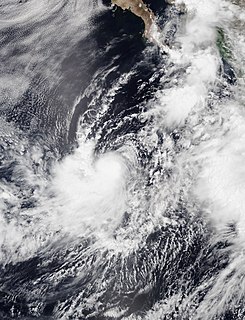The name Ivo has been used for four tropical cyclones in the Eastern Pacific Ocean:
The name Ivo has been used for four tropical cyclones in the Eastern Pacific Ocean:
The name Arlene has been used for eleven tropical cyclones in the Atlantic Ocean, making Arlene the most frequently used storm name in the basin.
The name Hanna or Hannah has been used for eleven tropical cyclones worldwide: five in the Atlantic Ocean and six in the Western Pacific Ocean. Hanna has also been used for one extratropical European windstorm.
The name Barry has been used for seven tropical cyclones in the Atlantic Ocean and for one in the Australian Region.
The name Chris has been used for seven tropical cyclones in the Atlantic Ocean.
The name Erick, or Eric, has been used for nine tropical cyclones worldwide, seven in the Eastern Pacific Ocean and one each in the South-West Indian Ocean and in the South Pacific.
The name Ismael was used for three tropical cyclones in the Eastern Pacific Ocean:
The name Tina has been used for five tropical cyclones worldwide:
The name Xavier has been used for three tropical cyclones and one extratropical cyclone worldwide.
Tropical Storm Ophelia may refer to:
The name Banyan has been used to name three tropical cyclones in the Western North Pacific Ocean. The name was contributed by Hong Kong and refers to Ficus microcarpa, a type of tree commonly seen in Southeast China.
The name Alpha or Alfa has been used for three subtropical cyclones and one tropical storm in the Atlantic Ocean:
The name Rita has been used for one tropical cyclone in the Atlantic Ocean and ten tropical cyclones in the western Pacific Ocean.

The 2007 Pacific hurricane season was a below-average Pacific hurricane season, featuring one major hurricane. The season officially started on May 15 in the eastern Pacific and on June 1 in the central Pacific, and ended on November 30; these dates conventionally delimit the period during which most tropical cyclones form in the region. The first tropical cyclone of the season, Alvin, developed on May 27, while the final system of the year, Kiko, dissipated on October 23. Due to unusually strong wind shear, activity fell short of the long-term average, with a total of 11 named storms, 4 hurricanes, and 1 major hurricane. At the time, 2007 featured the second-lowest value of the Accumulated cyclone energy (ACE) index since reliable records began in 1971. Two tropical cyclones – Cosme and Flossie – crossed into the central Pacific basin during the year, activity below the average of 4 to 5 systems.
The name Zeta has been used for two tropical cyclones in the Atlantic Ocean.

Tropical Storm Ivo was a tropical cyclone that brought heavy rainfall to five states in Mexico, causing severe flooding during August 2019. The tenth tropical cyclone and ninth named storm of the 2019 Pacific hurricane season, Ivo arose from a low-pressure area that spawned south of Guatemala on August 16. The low-pressure system gradually organized over the next several days as it tracked west-northwestward. The system coalesced into a tropical depression early on August 21 and strengthened into Tropical Storm Ivo several hours later. Located within a favorable environment of moist air and warm sea surface temperatures, the cyclone quickly intensified, peaking the next day with 1-minute maximum sustained winds of 70 mph (110 km/h) and a pressure of 990 mbar (29.23 inHg). Increasing wind shear caused the storm's intensification to level off later that day, as the system turned towards the north-northwest. Ivo passed by Clarion Island midday on August 23, generating winds of 60 mph (100 km/h) on the island. Wind shear caused Ivo to significantly degrade in structure and intensity during the next couple of days. Cold sea surface temperatures, as well as dry and stable air, caused the cyclone to degenerate into a remnant low early on August 25. The low meandered over the eastern Pacific before opening up into a trough of low pressure early on August 27.
The name Victor has been used for five tropical cyclones worldwide.